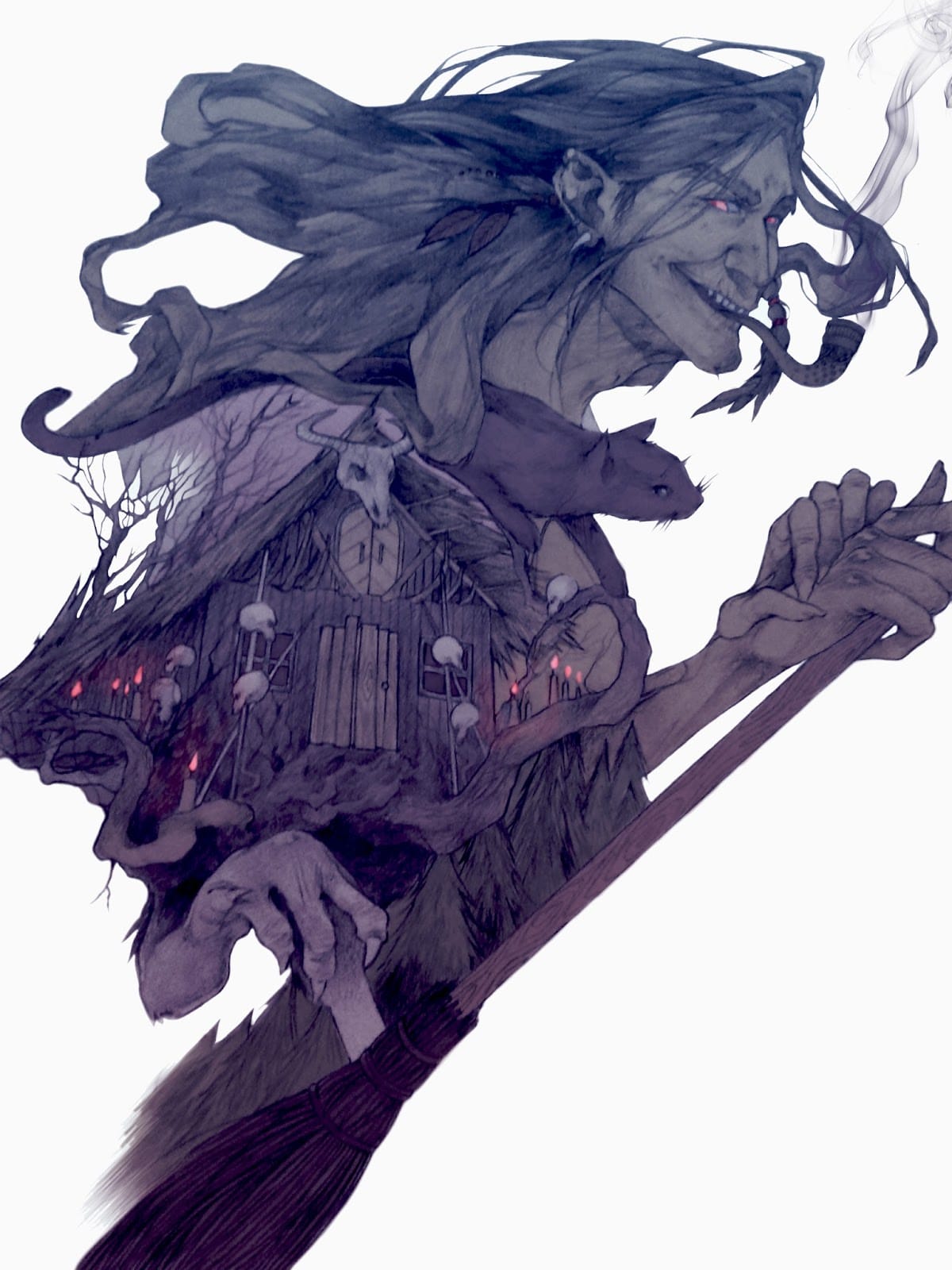Journey into the enchanting and often eerie world of Baba Yaga, the enigmatic sorceress of Slavic folklore. Our Baba Yaga story map will guide you through her mystical realm, uncovering the hidden meanings in her captivating tales. Explore symbolic locations, decipher the enchanting (and sometimes unsettling) objects found within her domain, and trace Baba Yaga’s enduring legacy in literature and beyond.
Unraveling the Mystery: Baba Yaga’s Place in Slavic Folklore
We first encounter Baba Yaga’s name in writing back in 1755, in Mikhail W. Lomonosov’s Russian Grammar. Listed among the names of gods, she is likely far older than any book, her stories passed down through generations, evolving with each telling, until finally being captured in written form. Baba Yaga’s ancient origins likely place her in a time before Russia as we know it existed, emerging from the beliefs of the ancient Slavs and their reverence for the natural world.
This long history of oral tradition might explain why Baba Yaga, unlike many fairytale figures, defies easy categorization. In some tales, she is a fearsome figure, inspiring dread in those who encounter her. In others, she acts as a guide, though often a capricious and demanding one, testing the heroes and heroines who dare to seek her out.
The Significance of Setting: A Deeper Look at Baba Yaga Tales
Baba Yaga’s world is not one of glittering castles and charming princes. Instead, picture a deep, dark forest, shrouded in mist and mystery. At its heart, you might stumble upon a dilapidated hut, perched precariously on dancing chicken legs—Baba Yaga’s legendary home.
This eerie dwelling, a constant in Baba Yaga stories, is no ordinary house. It represents a threshold, a place where the ordinary world blurs with the supernatural, and where those brave enough to enter might undergo profound transformations.
But Baba Yaga’s realm encompasses far more than just her home. It’s a rich tapestry woven from ancient stories and powerful symbols:
The Hut on Chicken Legs: More than just a dwelling, the hut itself is a being of magic, capable of turning away from those who seek entry, suggesting Baba Yaga’s control over destiny and choice. Some scholars even suggest the hut’s design might be linked to ancient burial mounds or the spirit houses used by shamans, further connecting Baba Yaga to the world of the dead and the power of ancient spirits.
The Forest of Trials: Forget a leisurely stroll, this is a place of magic and danger, where Baba Yaga tests the courage and wit of those who dare to enter. Navigating its winding paths alongside legendary figures, readers can explore the challenges posed by the unknown and discover their own capacity for resilience.
The Mortar and Pestle: These tools, so ordinary in most homes, become instruments of magic in Baba Yaga’s hands. Capable of grinding herbs for potent potions or perhaps even pulverizing the bones of the unwary, they hint at Baba Yaga’s dual nature, her connection to both the everyday and the extraordinary.
The Fence of Skulls: Perhaps the most visually jarring element of Baba Yaga’s domain, this fence, often topped with human skulls, serves as a chilling reminder of her power and the potential consequences of encountering her. This stark boundary underscores Baba Yaga’s deep connection to the natural world, particularly its inevitable cycles of life and death.
The River of Life and Death: Rivers in folklore often symbolize journeys, and this one is no different. But under Baba Yaga’s watch, it takes on a deeper meaning, representing the boundary between the world of the living and the realm of the dead. The map guides us across this profound boundary, reminding us of life’s fragility and the power Baba Yaga holds over both realms.
[If you are curious to locate the exact location of Nianini on a map, click on the link to unveil its precise coordinates and explore the area virtually.]
Decoding the Symbols: A Guide to Baba Yaga’s Possessions
Within her hut and surrounding her domain, Baba Yaga surrounds herself with objects as intriguing as she is. These are not mere possessions; they are symbols, offering clues to understanding this enigmatic figure:
Mortar and Pestle: While typically associated with domestic tasks, in Baba Yaga’s hands, these tools take on a more profound meaning. They might symbolize her ability to transform, to break down old ways of thinking and reshape destinies, much like nature itself constantly shifts and changes.
The Ever-Present Broom: Not just for sweeping, the broom likely symbolizes Baba Yaga’s ability to cleanse and purify, but also to traverse the spirit world, soaring through realms beyond our own. Some scholars suggest that the broom, combined with Baba Yaga’s mortar and pestle, form a symbolic connection to ancient Slavic beliefs about female spirits who could fly, often depicted with brooms and carrying pestles.
Beyond the Page: Baba Yaga’s Enduring Influence
Baba Yaga’s impact reaches far beyond the world of folklore. Her image appears in literature, films, and even video games, reflecting our ongoing fascination with the unknown and the powerful energy often associated with feminine figures in mythology.
Literature: From classic Russian tales like “Vasilisa the Beautiful” to modern fantasy novels, Baba Yaga continues to enthrall readers, offering a rich source of inspiration for writers exploring themes of magic, transformation, and the power of the feminine.
Film and Television: Baba Yaga has made her way onto both the big and small screens, appearing in films like “John Wick” and inspiring characters in television shows. These modern adaptations often draw on Baba Yaga’s fearsome reputation but also explore her capacity for wisdom and guidance.
Video Games: As guardians of ancient knowledge or formidable bosses to defeat, Baba Yaga frequently appears in the world of video games, challenging players to test their skills and confront the unknown. This digital realm offers a new platform for exploring Baba Yaga’s complex character and her enduring appeal to our imaginations.
Baba Yaga: A Journey of Exploration Awaits
Ready to delve deeper into Baba Yaga’s world? Here’s how you can embark on your own adventure:
Download the Free Baba Yaga Story Map PDF: Our meticulously crafted map pinpoints key locations from various Baba Yaga tales, offering visual context and sparking your imagination. Each stop is accompanied by brief story summaries, introducing you to the magic and mystery that await.
Bring Baba Yaga to the Classroom: Educators can use this map and the rich tradition of Baba Yaga stories to create engaging lesson plans. Students can explore Slavic folklore, analyze story structure, and even craft their own tales inspired by this captivating figure.
Craft Your Own Baba Yaga Adventure: Let the map be your guide as you imagine your own encounter with Baba Yaga. What would you ask her? What trials might you face? The possibilities are as limitless as Baba Yaga’s realm itself.
Baba Yaga, with her enigmatic nature and enduring presence in folklore and beyond, invites us to explore the wilder, more magical side of ourselves and the world around us. So, step into her domain, and let the adventure begin!
- SYBAU See You Baby Meaning: Gen Z Slang Evolves - July 1, 2025
- Unlock Your Inner Youth: Lifestyle Secrets for a Vibrant Life - July 1, 2025
- Decode SYBAU Meaning: Gen Z Slang Explained - July 1, 2025






